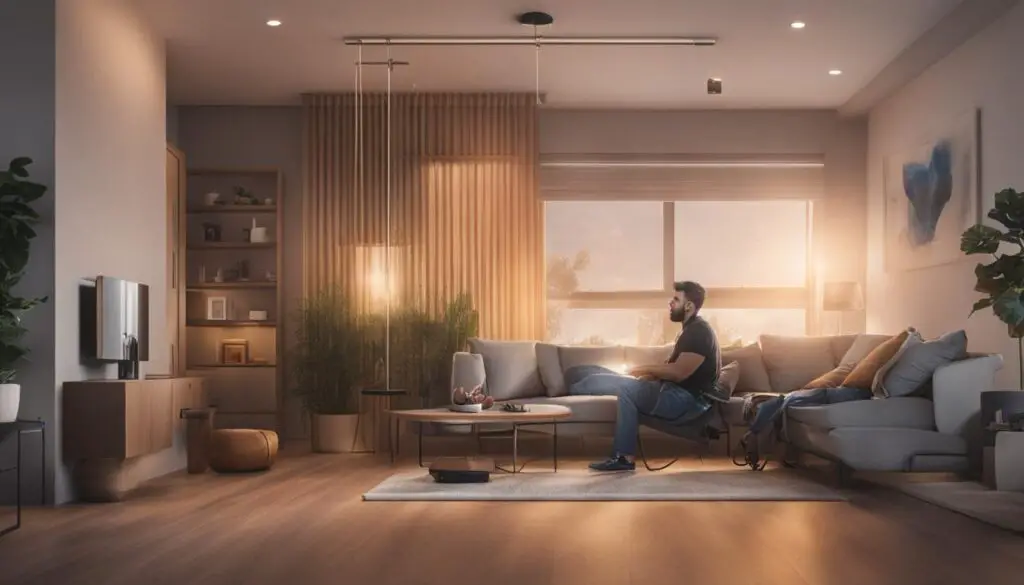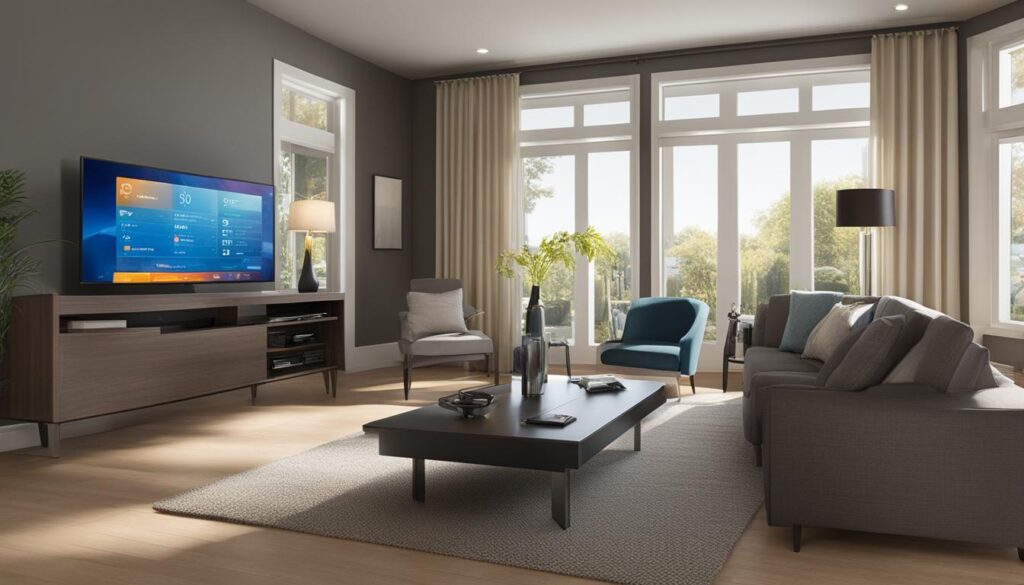In an increasingly inclusive society, the demand for home automation solutions for disabled individuals has grown significantly. Smart home technology offers a range of accessible home automation systems designed to enhance the lives of those with disabilities, providing greater independence, comfort, and convenience.
Smart home devices such as Amazon Echo and Google Home have become popular choices for individuals with disabilities. These devices, along with other smart devices like security systems, lighting systems, and garage door openers, are part of inclusive home automation solutions that cater to the unique needs of disabled individuals.
By offering hands-free operation, remote access, and customized settings, these technologies empower individuals with disabilities to control their environment with ease. Whether it’s controlling the lights, adjusting the temperature, or even opening doors, smart home technology offers a new level of accessibility.
Moreover, this assistive technology for disabled individuals not only improves their daily lives but also promotes equal opportunities for independent living. With the advancements in smart home technology, disabled individuals can create a more inclusive living environment and enjoy a better quality of life.
Table of Contents
Key Takeaways:
- Home automation solutions for disabled individuals provide enhanced accessibility and independence.
- Smart home devices like Amazon Echo and Google Home offer hands-free operation and remote access.
- Accessible home automation systems include security systems, lighting systems, and garage door openers.
- Smart home technology empowers disabled individuals to control their environment and improve their quality of life.
- Investing in inclusive home automation solutions promotes an inclusive living environment for all.
Smart Home Assistants
Smart home assistants like Amazon Echo and Google Home are invaluable tools for individuals with disabilities. These devices provide a wide range of features that enhance accessibility and independence in the home environment. By leveraging voice commands and automation, smart home assistants enable individuals to carry out daily tasks effortlessly, regardless of their motor skills.
With smart home assistants, individuals with disabilities can automate various activities, such as setting alarms, controlling appliances, and even ordering services like Uber. The hands-free nature of these devices eliminates the need for physical interaction, empowering individuals to navigate their surroundings more easily.
By simply using their voice, individuals with disabilities can control their smart home devices, making it convenient and efficient to manage their homes. Whether it’s adjusting the temperature, turning lights on and off, or playing music, smart home assistants provide a seamless and intuitive experience.
These smart devices also offer integration with a wide range of smart home hubs, allowing individuals to control multiple devices and systems from a central point. Smart hubs serve as the command centers, enabling individuals to interact with various smart devices throughout their homes.
“Smart home assistants revolutionize accessibility and independence for individuals with disabilities by transforming their voice into a powerful tool for controlling their environment.” – Tech Magazine
Benefits of Smart Home Assistants for Disabled Individuals
1. Enhanced Independence: Smart home assistants enable individuals with disabilities to perform daily tasks and control their environment independently, without relying on physical interactions.
2. Hands-Free Operation: The voice-controlled nature of smart home assistants eliminates the need for manual input, making it easier for individuals with limited mobility or dexterity to manage their smart devices.
3. Convenience and Efficiency: With smart home assistants, individuals can perform multiple tasks simultaneously, saving time and effort in completing everyday activities.
4. Seamless Integration: These devices seamlessly integrate with other smart home devices, creating a cohesive ecosystem that promotes accessibility and convenience throughout the home.
5. Personalization: Smart home assistants can be customized to suit individual preferences, allowing disabled individuals to create personalized settings that enhance their comfort and convenience.

In summary, smart home assistants are powerful tools that empower individuals with disabilities, providing them with greater accessibility, independence, and control over their home environment. By leveraging voice commands and automation, these devices revolutionize the way disabled individuals interact with their surroundings, offering a more inclusive and convenient living experience.
Smart Security Systems
When it comes to the safety and security of disabled individuals, smart security systems are a game-changer. These systems, consisting of smart locks and doorbells, provide peace of mind and convenience for those with limited mobility or difficulty responding to emergencies.
Smart locks offer remote control access to the home, allowing homeowners to grant temporary access to caregivers, family members, or other visitors while maintaining control and monitoring through smartphone apps. With just a few taps on their phone, individuals with disabilities can unlock the front door for a caregiver or a trusted friend, eliminating the need for physical keys and reducing the risk of unauthorized access.
Smart doorbells equipped with motion sensor technology are another essential component of a comprehensive smart security system. These doorbells allow homeowners to see and communicate with visitors without having to physically go to the door. For disabled individuals who may have difficulty moving around or reaching the front door in a timely manner, smart doorbells provide an extra layer of convenience and security.
“Smart security systems, including smart locks and doorbells, provide a secure and accessible home environment for individuals with disabilities.”
With remote access capabilities, homeowners can monitor their homes from anywhere, giving them peace of mind and ensuring their safety. Whether they are in another room or away from home, disabled individuals can easily check who is at the door, grant access, or even contact emergency services if necessary.
In addition to remote access, smart security systems can be integrated with other smart home devices, such as cameras and alarms, creating a comprehensive and interconnected security network. This integration allows individuals with disabilities to have full control and visibility over their homes, enhancing their sense of safety and independence.
Enhancing Safety with Smart Security Systems
Smart security systems offer a range of benefits for disabled individuals, including:
- Remote access and control of the home
- Monitoring and communication capabilities
- Increased convenience for granting access
- Integration with other smart home devices
By combining smart locks and doorbells, disabled individuals can create a secure and accessible home environment that meets their specific needs. These smart security systems provide the peace of mind and independence that every homeowner desires, ensuring the safety and well-being of disabled individuals.
| Benefits of Smart Security Systems | Features |
|---|---|
| Remote access and control | |
| Monitoring and communication | |
| Convenient access management | |
| Integration with other smart home devices |
Smart Lighting
Smart lighting systems offer a range of accessibility features that greatly benefit individuals with disabilities. These systems provide a convenient and independent way to control lighting in the home, enhancing accessibility and eliminating physical barriers. Through smartphone apps, users can easily turn lights on and off or adjust brightness levels without the need to reach or access traditional switches. This feature is particularly valuable for individuals with mobility challenges, as it allows them to control their home’s lighting with ease.
One of the key advantages of smart lighting is the ability to customize lighting settings based on individual preferences. With just a few taps on a smartphone, users can create different lighting moods to suit their needs, whether it’s bright lighting for productive activities or dim ambient lighting for relaxation. The ability to personalize lighting not only adds a touch of luxury and convenience but also promotes a more comfortable and enjoyable living environment.
Additionally, smart lighting systems can be integrated with other smart home devices, such as voice assistants or motion sensors, to enhance accessibility and automation. For example, users can set up voice commands to control their lights, allowing for a hands-free experience. Moreover, motion sensors can be utilized to automatically turn on lights when someone enters a room, further eliminating the need for manual interaction.
In summary, smart lighting systems provide accessibility features, customized lighting options, and independent control for individuals with disabilities. By eliminating physical barriers, these systems empower disabled individuals to create a safe, comfortable, and inclusive living environment.
Conclusion
The advent of home automation solutions for disabled individuals has had a profound impact on the lives of people with disabilities. These smart home technologies have paved the way for increased accessibility, independence, and a more inclusive living environment.
With the aid of smart home assistants like Amazon Echo and Google Home, disabled individuals can effortlessly control their homes through voice commands, eliminating the need for physical interaction with appliances and devices. This hands-free operation promotes greater independence and convenience, allowing individuals to perform daily tasks more efficiently.
Furthermore, smart security systems have become crucial in ensuring the safety and security of disabled individuals. Smart locks, doorbells, and surveillance cameras enable remote access and monitoring, providing peace of mind and a sense of control. This technology allows individuals to grant temporary access to caregivers or family members while maintaining the overall security of their home.
In addition, smart lighting systems offer a new level of accessibility by enabling customizable lighting options that cater to the unique needs of disabled individuals. With the ability to control brightness, colors, and even create preset lighting scenes, individuals can create a comfortable and inclusive living environment that enhances their overall well-being.
In conclusion, home automation solutions for disabled individuals have transformed the way they experience their homes. The integration of smart home technology, from smart assistants to security systems and smart lighting, empowers disabled individuals to live more independently and comfortably. As technology continues to advance, these home automation solutions will play a crucial role in creating a more accessible and inclusive future.
FAQ
What are some home automation solutions available for individuals with disabilities?
There are various home automation solutions specifically designed for individuals with disabilities, including smart home technology, accessible home automation systems, and inclusive home automation solutions. These technologies aim to enhance independence, comfort, and accessibility for disabled individuals.
How can smart home assistants benefit individuals with disabilities?
Smart home assistants such as Amazon Echo and Google Home offer hands-free operation and voice command capabilities, making them valuable tools for individuals with disabilities. These devices can automate tasks, control appliances, and order services, providing greater independence and accessibility in the home environment.
What are the benefits of smart security systems for individuals with disabilities?
Smart security systems, including smart locks and doorbells, offer remote access and monitoring capabilities, which are essential for individuals with disabilities who may have limited mobility or difficulty responding to emergencies. These systems provide secure and accessible home environments, allowing homeowners to grant temporary access and communicate with visitors without physical interaction.
How do smart lighting systems enhance accessibility for individuals with disabilities?
Smart lighting systems allow individuals to control their lights through smartphone apps, eliminating the need for physical access to switches. They also offer customizable settings to create different moods and preferences. For individuals with mobility challenges, smart lighting systems increase accessibility by eliminating the need to reach or move around to control lights in their homes.
How do home automation solutions benefit individuals with disabilities?
Home automation solutions provide enhanced independence, accessibility, and convenience for individuals with disabilities. Specifically designed smart home devices, such as smart home assistants, security systems, lighting systems, and garage door openers, cater to the unique needs of disabled individuals, offering hands-free operation, remote access, and customized settings. These technologies empower disabled individuals to live independently and comfortably in an inclusive home environment.
Source Links
- https://madimack.com/au/blog/the-best-smart-home-devices-for-people-with-disabilities
- https://timesofindia.indiatimes.com/blogs/voices/designing-for-accessibility-how-home-automation-is-empowering-people-with-disabilities/
- https://www.cannyelectrics.com.au/how-can-home-automation-help-people-with-disabilities/


